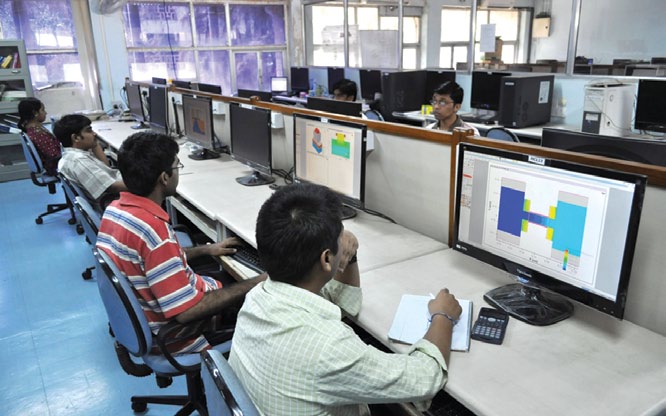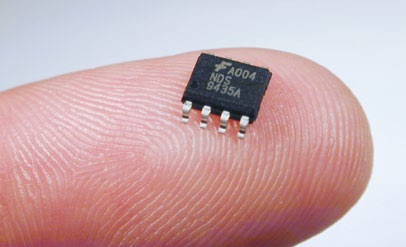 Engineers working at a nanoelectronics computation lab (Image courtesy: www.ee.iitb.ac.in)
Engineers working at a nanoelectronics computation lab (Image courtesy: www.ee.iitb.ac.in)
Involved with the utilisation of nanotechnology in electronic components, nanoelectronics is perhaps one of the increasingly important areas for the years and decades to come. From designing medical devices to building better batteries, and from manipulating molecules to manufacturing, nanoelectronics is truly a fascinating field to have a career in, though it does not yet have a significant presence in India.
Nanoelectronics in India
A unique initiative for accelerating research and development in nanoelectronics in India was launched in August 2008 at the Centers of Excellence in Nanoelectronics (CEN) at Indian Institute of Science, Bangalore (IISc) and Indian Institute of Technology, Bombay (IITB). The Indian Nanoelectronics Users Program (INUP) intends to facilitate experimentation of research ideas of Indian researchers in the general area of nanoelectronics. Conceived and funded by the Department of Information Technology (DIT), the Ministry of Communications and Information Technology, government of India, this program aims at providing hands-on training to researchers from R&D organisations in India and facilitating advanced research by enabling implementation of their research work. Details about the INUP program can be found at http://www.inup.org.in.
The phenomenal growth in the CMOS technology over the past four decades has enabled very high performance compute and storage systems, powering the information technology revolution. The MOS transistor has metamorphed from a few tens of microns dimension in 1970s to a few tens of nanometres today. Semiconductor memory and high-performance logic circuits have been the technology drivers to architect the miniaturisation of the MOS transistor, and this will continue in the foreseeable future. The underlying premise of this growth is the ability to miniaturise the MOS transistor dimension by 30 per cent, in every two-year cycle on an average.
 Nanoelectronics: Application of nanotechnology in the field of electronics and electronic components (Image courtesy: http://childfriendlynews.com/tech-stuff-that-kids-should-know)
Nanoelectronics: Application of nanotechnology in the field of electronics and electronic components (Image courtesy: http://childfriendlynews.com/tech-stuff-that-kids-should-know)
The scaling of MOS transistor in nanoelectronics era necessitates the exploration of new materials (high-k gate dielectrics such as HfO2, Er2O3, Gd2O3; new channel materials such as germanium and graphene) and new device structures (double-gate FET, FinFET, Schottky source/drain FET). The facilities available at the centre provide an opportunity to carry out both experimental research and design and modelling research for nanoelectronic devices. There are several groups in the institute, working on various aspects of synthesis of new materials, processing techniques, device structures, modelling and simulation.
Current scope in India
Talking about how this sector is poised to grow in India, Nirav Kothari, founder and owner, Nilima Nanotechnologies, informs that it is at a very nascent stage. He says, “All the activity that is happening is only at the laboratory scale, with not very large levels of funding. This is restricting innovation, thereby reducing lab-to-marketplace products. However, the innovations that are actually made do possess potential. Many gaps need to be filled in though.”
On a similar note, Krishna Kant, managing director, AVANSA Technology & Services says, “At present, it is in very early stages. It is growing rapidly and will be big in coming years.”
[stextbox id=”info” caption=”Top nanotechnology colleges in India”]• IITs at Mumbai, Kanpur, Chennai, Guwahati and Delhi
• Amity Institute of Nanotechnology (AINT), Noida
• Biosys Biotech Lab & Research Centre, Chennai
• Indian Institute of Science, Bangalore
• National Institute of Technology (NIT), Rourkela
• National Institute of Technology (NIT), Kurukshetra (Haryana)
• Maulana Azad National Institute of Technology (MANIT), Bhopal
• Amritha Centre for Nanosciences (ACNS), Kochi
• Jawaharlal Nehru Center for Advanced Scientific Research, Bangalore
• Centre for Nanotechnology & Advanced Biomaterials (CeNTAB), Sastra University,
Tamil Nadu[/stextbox]
[stextbox id=”info” caption=”Top global institutions for nanotechnology”]• State University of New York (Albany), USA
• TU Dresden (Technische Universität Dresden), Germany
• Imperial College, UK (Master’s degree by research)
• University College of London, UK (MSc in nanotechnology)[/stextbox]
Surinder Bhagat, country HR head, Freescale Semiconductor India Pvt Ltd, adds that, “We are yet to see students coming with the specialisation in nanoelectronics, but I maintain that there are huge opportunities in the sector and is yet to boom in India.”
Further adding on the scope for a career in India, Nirav says that, “In India, there isn’t much unless you are employed with a blue-chip firm with a dedicated interest in nanoelectronics, where constant R&D is performed, allowing a hands-on approach for engineers desiring to work in the field. There aren’t many ‘nano jobs’ available.”
Educational requirements
Nanotechnology is mostly involved with properties and interactions of matter, and thus physics, chemistry and biology all come into play. However, nanoelectronics is an interdisciplinary field where electronics, engineering and science intersect. Studying science or engineering, and paying attention to the developments in electronics and semiconductors, can provide you with a solid foundation for any broad range of careers.







